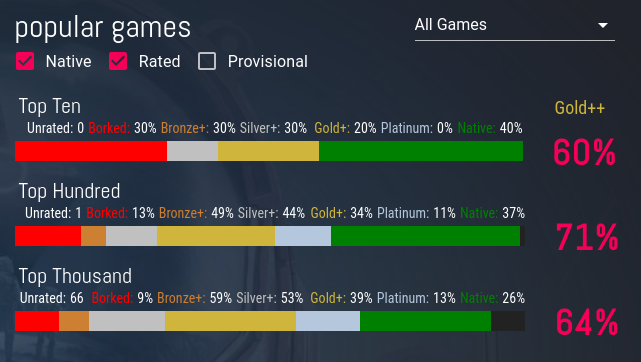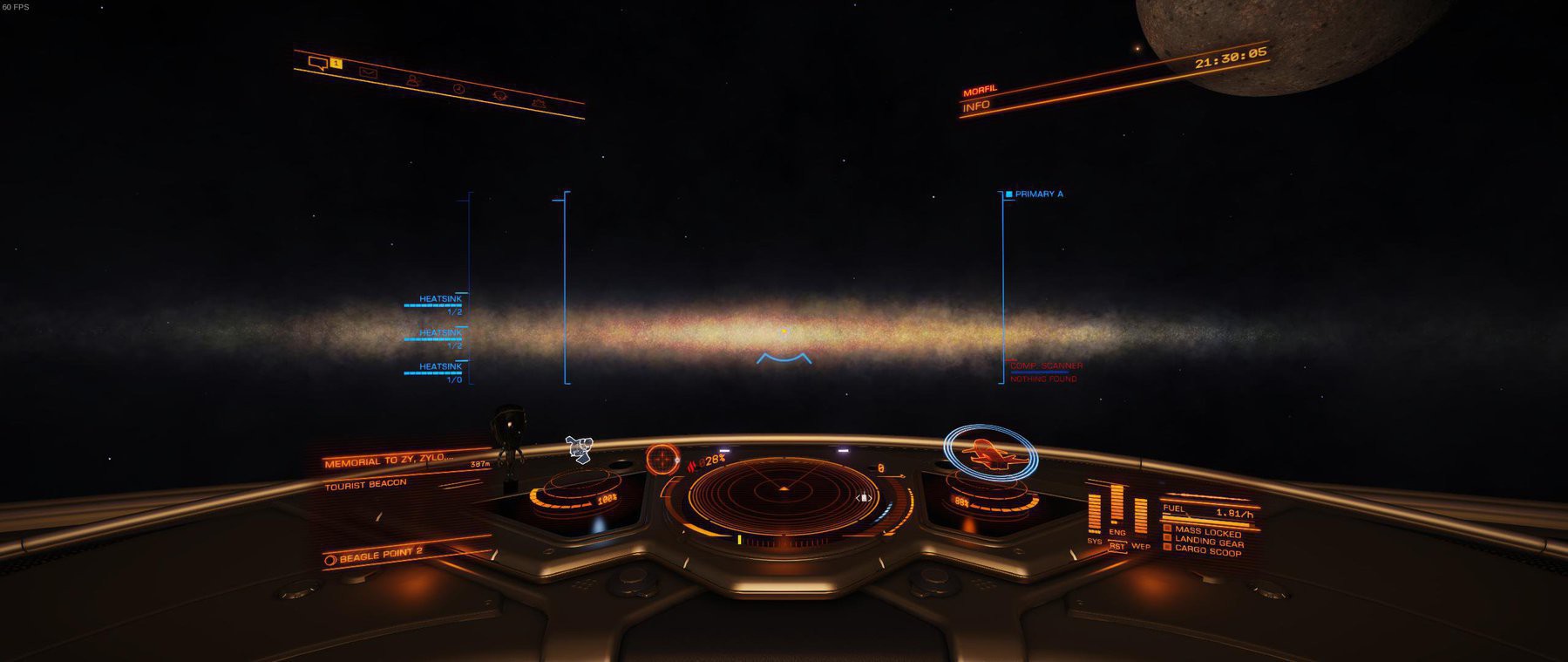Linux Gaming at the Dawn of the 20s
- published
- reading time
- 7 minutes
2019 was a fantastic year for Linux gamers. At the end of the decade we had almost two thirds of the top one thousand steam games rated gold and above in terms of Linux compatibility. By contrast, just one year earlier, that number would have been sitting at the native game proportion of only a quarter. In plain numbers that’s 400 out of the top 1000 steam games unlocked for Linux in a single year. From one angle that’s a slight exaggeration — a number of these games were playable with older versions of Wine — but arguably the performance, stability, and ease of use at the time just didn’t hold up to what we have today. Linux gaming has, for all intents and purposes, evolved into something new.
 ProtonDB compatibility ratings as of 8th Jan 2020
ProtonDB compatibility ratings as of 8th Jan 2020
Behind the scenes there’s still a feeling of unease. It’s a renaissance of sorts where the benefits are so real and tangible they’re impossible to ignore, but they come at the cost of less native ports and more developers passively relying on Proton without offering official support. It’s also worth speaking directly to those of my native Linux porting friends who have in the last year or so moved on to other endeavours, myself included. Working with you on this platform was an absolute pleasure, I believe we did valuable work at the right time and place, and while I’m sad to see it now overshadowed, I don’t think it’ll be forgotten. We have been given a real and tangible opportunity to bring more folks to our platform and to morph the public perception of Linux, and if we grab that by the horns then I have no doubt our work will be needed again in the future. Here’s to teaming up on great things when the wind changes.
So where are we at the dawn of the 20s? Well, there’s some bumps in the road, but we’re speeding ahead. Recently, a game I’d assumed we’d never be able to play, came to steam for PC in the form of Halo: MCC and is perfectly playable in single player on Linux. It’s a stark reminder of one of the elephants in the room though — anti-cheat. For Halo, Bungie have done us all a favour by providing an anti-cheat free single player, but for other games, developers aren’t so nice. The lifetime bans you may have heard about aren’t typically the mean spirited “because you’re on Linux” some will have you think, they’re almost always automated bans triggered by anti-cheat paired with developers with single-strike mentalities. Valve are working on anti-cheat, so I’d expect some small steps on this front soon. That’s not the only problem though — many games, particularly always-online games, update frequently enough that their risk of hitting Proton bugs or quirks rises significantly. This one I feel at least has a more pragmatic solution — the fixes found get integrated and usually won’t happen again, building up the compatibility layer’s resistances just like a human immune system, but it’s unlikely to ever be “perfect” enough for some folks.
These issues with Proton validate the scepticism we see in the community — if they can’t be improved, then the likely hood of pushing away gamers who expect the latest online and updated games to work flawlessly will keep itself high, and developers will stay wary of giving the Proton version their support or approval. There are developers who are happy to let folks use Proton by way of Valve’s official whitelist, which I’d expect to grow again this year, and many out there who have shown themselves non-hostile — I personally haven’t been aggressively shut down on my support tickets sent to Frontier about Elite Dangerous, or by Ghost Ship when contacted about early access game Deep Rock Galactic, so I believe a healthy relationship is possible, but we need be make visible and not fund developers shun Proton, perhaps with another column or entry in ProtonDB.
 The Milky Way, from all the way out
The Milky Way, from all the way out
What seems like aeons ago, in 2018, I made a small video as an honest and heartfelt attempt to highlight the amount of great native Linux games. You can read much more about that in the story I posted at the time. It may seem like a swansong now, but I think it’s more relevant than ever. It shows that even without Proton’s impact, Linux gaming was thriving in it’s own niche, and it’s well worth a watch.
./Games - A Native Linux Gaming Celebration
Some time in 2019 I decided to put myself out there and create something again, I sent the word out that I wanted to make a video that showed off Linux gaming as it is today — highly compatible with thousands of games we never had access before. Just like before, I asked for help in gathering footage, this time using a Github repo and wiki, and the response was amazing. 250 clips were contributed coming out at 10GB of data. To all those that helped, thank you so, so much. I’m in your debt. Come to a LUG or Linux event in London sometime, I’ll by you a beverage or three.
My native video was mostly just a celebration montage, not targetted to any particular audience besides myself, and only marketing Linux gaming itself on a surface level. It was an inward-aimed war-cry against misrepresenting Linux gaming in the media, and I preferred it that way, but in the spirit of a new decade and a fresh start I had to make something “bigger”. It’s a shorter video, but one that tries to have a much wider impact, and I’ll be sharing it soon once I’ve ironed out the details about how to make a proper splash.

The kdenlive timeline for video 2: electric boogaloo
Every time I devote myself to this kind of creative endeavour, I’m endlessly appreciative of the kind of stress involved for the artists and creators who constantly put themselves out there. This one took me months longer than I expected, and has gone through 15 draft iterations, each with their own problems, refactors and re-writes. Just like the last one, is far from perfect, it’s still not professional (though I’ve definitely made some real headway), but I absolutely love it. It’s a rallying cry aimed outside of our little bubble, begging to be seen and heard by folks who don’t know an alternative exists, or weren’t aware of what it’s now capable of. It aims to rouse questions, challenge expectations and share our pride, and if it does just one of those for you, then I’ll consider it a success.
It will also be very important to get one aspect of this video right — there’s a real risk when we show people Linux gaming that we give them the wrong impression about the games they may want to play. A measured approach is clearly better — show games that work well and direct people to protondb.com or lutris.net/games for anything else. To ensure I stuck to that, I set clear rules: for a non-native game to be featured it had to be at least qualify for a Silver rating on ProtonDB or equivalent. Silver is defined as “Runs with minor issues, but generally is playable”. I think it’s paramount we all have similar high standards when we talk about Proton to folks for the first time, so I hope others follow suite. Most of the games in my video are Gold or above, and I’ve carefully ensured the few silver games only have very minor problems.
Alongside my work and others, a movement to make a convincing attempt at pervasive Linux marketing is bubbling up with the aim to show off Linux in ways we’ve not really seen since IBM’s 2003 “The Future Is Open” advertisement. If we’re going to weather this Proton storm I strongly suspect we need to capitalise on the momentum we’ve gained as soon as we can, and rally behind a common goal of raising awareness of Linux as a viable and sensible alternative to Windows and Mac, for the obvious advantages of security and privacy, for it’s superior personalisation and control, but even for gaming. Expect significant headway to be made on that front in near future, get in touch if you want to help.
Linux gaming has never been better, so let’s share that message.
(Story originally posted on Medium)
UPDATE 08/03/2020: Since posting, I finally released the video under the Make It Linux umbrella. Enjoy!

